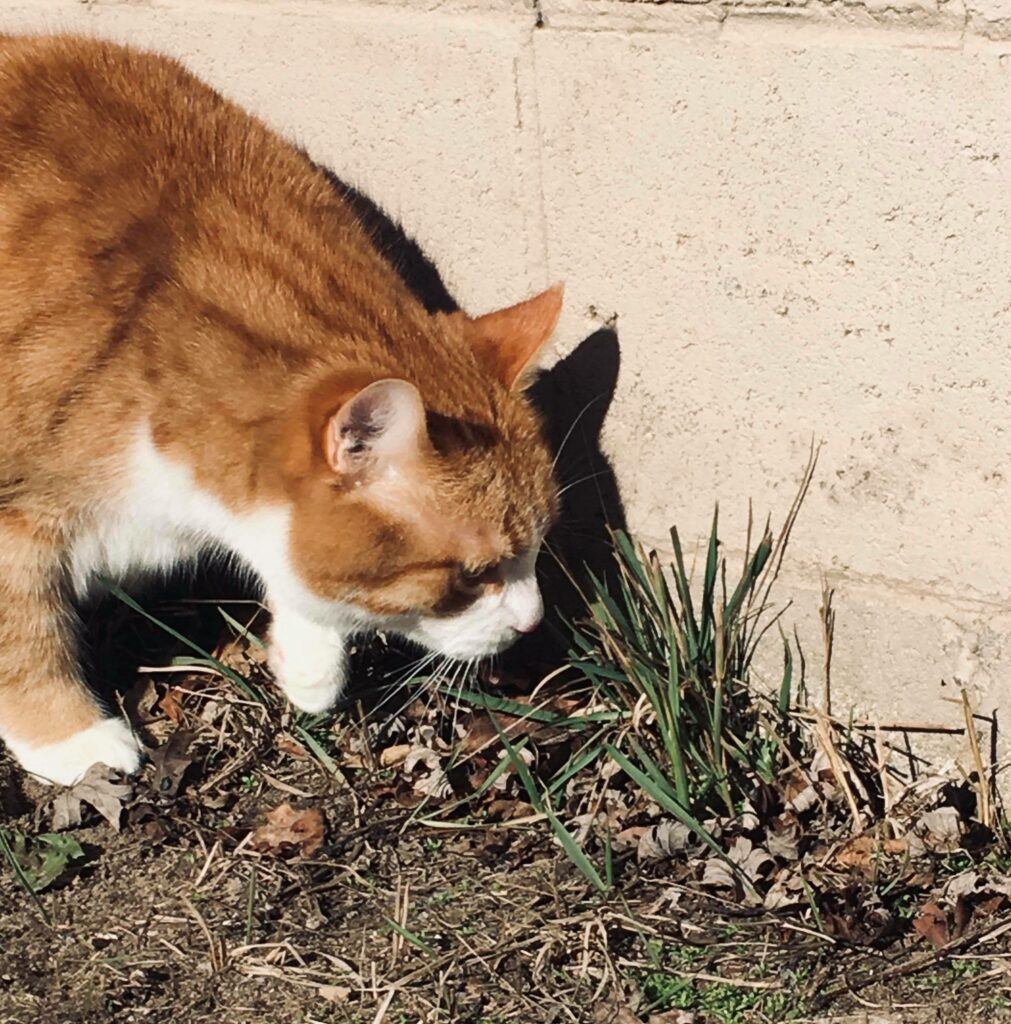This post may contain affiliate links. This means I may receive a small commission if products are purchased through them. All opinions are honest and remain my own.

My cat Charlie is a plant junkie. I can’t keep plants around the house because he will gobble them up, and he never misses a chance to escape out the back door and eat grass. The thing is, he ALWAYS immediately pukes it all up afterward. It got me thinking, why do cats eat plants and then just throw them up? Maybe an oddly specific question, but I was genuinely curious.
There’s no exact answer to why cats may eat grass and other plants. Some theories include boredom, nutritional deficiency, OCD, or stomach upset. However, according to the most recent research (2019), it’s believed cats may eat plants due to an inherited trait from wild ancestors who gnawed on greenery in an attempt to purge the parasitic loads from their intestines. Some cats vomit afterward because their bodies aren’t evolved to chew and digest plants.
Why does eating plants make cats vomit?
The most interesting thing I learned is that according to the most recent studies, most cats actually do not puke after eating plant matter. The study, which you can learn more about here, showed only 27% of the observed cats that ate plants actually regularly threw up.
Still, many cats DO puke after eating greenery – so why is that? It’s not necessarily a bad thing or a sign your cat is sick, so don’t immediately freak out. If you’ve ever seen what comes out after a cat pukes up some plants – you’ll notice it’s whole and not chewed down at all. Cats will literally swallow it unchewed because they don’t have molars to break it down, and once it’s in their stomach their digestive systems lack the enzymes to break it down further. This causes immediate expulsion in many cats.
But perhaps the type of plants, amount, and speed at which it was eaten (as well as the sensitivity of the feline’s stomach) all play a part in this as well. Because this new research proves that grass and other plants are actually still able to make its way through their systems, at least in the majority of cats.
This means there must be other reasons most cats eat plants besides trying to induce a vomiting episode.
Theories behind why cats like to eat plants
Nobody knows for sure why these furry obligate carnivores like munching on greenery. However, there is lots of speculation.
Common theories include:
- Seeking relief for an upset stomach, or to help eliminate hairballs
- OCD
- Curiosity
- Boredom
- Vitamin deficiency
- Seeking a different texture sensation
- An instinctual urge to rid the intestinal tract of parasites (according to the most recent research)
Instinctual urge (that’s not to cure tummy troubles or purge hairballs)
While there are many reasons/theories behind why cats engage in this behavior, the newest studies suggest that the behavior to eat grass (and other plants) is by in large, instinctual.
The study surveyed 1,021 indoor-only cat owners and found that 71% of the cats were observed to eat grass more than 6 times in their life while only 11% of them never did at all.
91% of the time, the cats were reportedly acting normal with no signs of illness before they ate the plants, and only 27% of the cats that ate plants were reported to regularly vomit afterward.
What the researchers took away from these results that it’s not very likely cats are doing this to purposely make themselves throw up (which is one of the prevalent theories out there).
Here’s an excerpt from Smithsonian Mag:
Instead, the team believes that eating grass is still part of health regimen, just one that most companion animals don’t need to engage in today. It turns out that field studies of wild carnivores and primates have found that they regularly eat non-digestible grass and other vegetation to purge parasitic worms from their systems. Cats, the team believes, regularly eat grass to stimulate muscle activity in their digestive tracts and force the parasites from their guts. “Given that virtually all wild carnivores carry an intestinal parasite load, regular, instinctive plant eating would have an adaptive role in maintaining a tolerable intestinal parasite load, whether or not the animal senses the parasites,” the authors conclude in their summary.
Source: Smithsonian Mag
A 2008 study on dogs and cats eating grass showed similar findings.
All in all, the researchers take away was that it’s rather unlikely cats are doing this to cure an upset stomach, or purge hairballs, since most cats aren’t even throwing up at all. In actuality, it acts as a natural laxative that helps clear their digestive tracts from parasites. Even though most domesticated cats fed cat food won’t carry parasites, they can still engage in this behavior out of instinct.
Are plants safe for cats?
Rest assured that the majority of plants are safe for cats to eat, so if you witness your feline puking up grass or other plants it’s probably not anything to worry about.
But unfortunately, certain species of plants can be dangerous or even deadly to felines. The best way to avoid your pet eating a toxic plant is to be aware of the ones that pose the greatest risk and keep them out of your home (and yards if they go outdoors).
According to Poison Pet Helpline, these are the most toxic and common plants that are dangerous to felines:
- Autumn Crocus
- Azalea
- Cyclamen
- Kalanchoe
- Lilies
- Oleander
- Dieffenbachia
- Daffodils
- Lily of the Valley
- Sago Palm
- Tulips and Hyacinths
This is not an all-inclusive list, so if you’re curious about a particular type not mentioned, do your research. Some plants, like Aloe Vera, are mildly toxic but not usually deadly.
If you’re worried or unsure about a plant your cat ingested, here’s the information to get in contact with Animal Poison Control:
Number: 888 -426-4435 (available 24/7, 365 days a year)
Website: https://www.aspca.org/pet-care/animal-poison-control
How to keep your cat from eating plants
If you have a cat that goes outdoors, this may be impossible. The best thing to do is to make sure there are no toxic plants in your yard that kitty can access. Also, stay away from using any chemical sprays (like pesticides/insecticides) in your yard that could be harmful as well. If you do use sprays, read the labels carefully to make sure they’re cat safe.
For indoor cats that munch on your houseplants, there are a few things you could do:
- Keep plants out of reach – try hanging them from the ceiling instead of keeping them somewhere a cat could jump, or shut them up in rooms your cat is unable to access
- Only keep houseplants your cats wouldn’t be tempted to eat – cactus, roses, rosemary, and “scaredy cat plant” may work.
- Put lemon peels in the soil
- Use cat deterrent sprays, or make your own spray with 1 part vinegar to 3 parts water. Simply spray on the leaves and in theory, it can keep cats away
- Decorate with fake plants instead
Safe plants
If cats eating plants is truly instinctual, it may be better to just provide safe alternatives for them rather than trying to stop it.
A good idea is to get your cat its own special plant – they have cat grass you can buy online or at pet stores, or you could keep houseplants that are “cat safe”. Some common house plants that are safe for your cat are spider plants, areca palms, orchids, and baby tears. You can read this list to get more ideas.
The Bottom Line
Because cats are carnivores, they don’t need and aren’t evolved to eat plants. Their teeth aren’t designed to chew it properly, and their digestive system hasn’t evolved the proper enzymes to digest it. Therefore, it’s not uncommon for some cats to regurgitate plant matter. Seeing your cat vomit leaves or grass on the floor isn’t necessarily a cause for concern. However, if you do notice unusual behavior or suspect your cat ate a poisonous plant, get in touch with Animal Poison Control or call your vet right away.

Leave a Reply